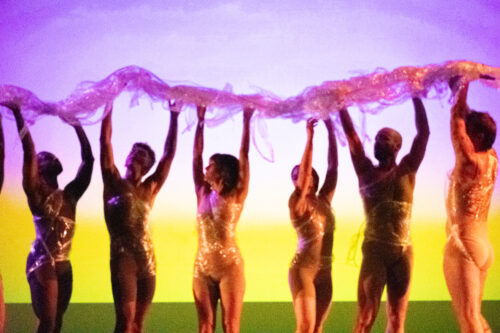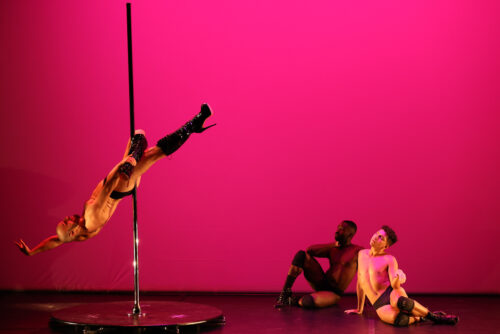The Limitless Dance Festival is a Timely Showcase of Diverse Post-Pandemic Reactions

Rivkah French Choreography (RFC) presented the inaugural Limitless Festival weekend of dance November 1-3 of this year at the always inviting DeLuxe Theater on Lyons Street in Houston’s Fifth Ward. The location – and the fact that Fifth Ward residents were invited to participate in the fest for free – is characteristic of RFC’s ethos of producing work for and with audiences and collaborators outside of the mainstream. Founder and Director Rivkah French also produced the Houston Fringe Festival and ran the FrenetiCore company and space, all endeavors to spotlight art from the margins of the creative marketplace.
Uniting dancers from ballet, contemporary, modern, and hip-hop, the Limitless Festival aimed to express post-pandemic recovery and freedom. “Liberation” is a word that is used to describe the festival’s intent, and it is an intriguing lense through which to look at a post-pandemic world. How did you liberate yourself when the pandemic ended?
The Garage 713 crew celebrated freedom with enthusiasm and community. Their performance was all about people; their individuality, their relationships, and their collective influence. Groups of various sizes moved on and off stage in a bustling, joyful, precisely choreographed commotion. Breakout groups were sometimes sexy, sometimes bombastic, always erupting with bonhomie. It is always satisfying to see a diverse group of bodies and skills in an ensemble, and Garage 713 was an absolute feast of variety inside of tight collaboration and evident communal joy.
For the dancers of Uptown Dance, post-pandemic freedom meant the freedom to travel and to soak in influences and experiences that were unavailable – were forbidden – during lockdown. Artistic Director Beth Gulledge-Brown travelled to France, came home to Houston, and choreographed “C’est la Vie” to songs by French artist Slimane. The more upbeat selections have a syncopation that give them a world music or a beachy, Rivera or island French feeling which Gulledge-Brown captured in whimsical mannerisms that are repeated throughout the pieces. The flowy, jewel-toned costumes contributed to the beachy, island feeling of the dances but were more of a wafting baseline for the adagio solos and duets. Uptown’s dancers are delightful in their skill and artistry, magical in their superhuman strength and gravity-defying skills. Gullege-Brown wants audiences to know that the company is “thrilled to be performing live in theaters again.”
Jen Passios and Jacob Regan’s title, “Apply Pressure and Wait,” could be a description of the Covid social “recipe,” if you will. It resonates with my memory of unfamiliar habits in familiar places, and the pressure of the wait itself; an off kilter holding pattern was the routine. For Passios and Regan, the first part of the pandemic was spent in a small Boston apartment shared with friends. In the latter part of the pandemic, they “took to the road and traveled together around the country for a year before ending up in Texas. We kept our distance by driving to places with a lot of space, or at least enough space for a tent. Our livelihood was frugal and simple. That remains true now.”
Pressure plus time also equals geology, and geography, and that is what I saw referenced in “Apply Pressure and Wait.” Passios and Regan inhabited forms in relationship to each other; some relationships were more balanced and supportive than others, all were fully embodied and taken to the edge of physical possibility. The forms interacted at different levels of complementarity, sometimes in sustainable balance and sometimes working at dissimilar purposes. The dancers had an uncommon amount of confidence and comfort controlling one another’s bodies, a mutual familiarity that might only be possible because of the amount of time they spend together on their craft and the fact that they are partners in all parts of life, not just on the dance floor. Says Passios and Regan of the post-pandemic period, “we can’t attribute any variety of “liberation” to the post pandemic period specifically; liberation feels like far too grand a word for our circumstances. We are two people who love each other and make dances. Time continues to teach us who we are. That is a beautiful gift.”
Fresh from earning her BFA at Sam Houston State University, Aniya Wingate came home to Houston and placed her piece “Shadow Work” on the Urban Souls Dance Company. She describes the piece: “as the dancers shift from tension and uncertainty to moments of release and confidence, the movement captures the nuances of personal growth.” I love this way of looking at both the pandemic and post-pandemic period. I think we all felt the pendulum swing from uncertainty to release, and maybe even confidence, and back and forth again as we navigated the shutdown. The results of the pandemic are usually measured in terms of loss; loss of relationships, businesses, momentum, time. But there was personal growth, especially if we prioritized it. Wingate’s growth focus was not on the sunny platitudes or sarcastic memes that got some of us through tense days. The focus of “Shadow Work” is the work of paying attention to what is happening in dark places. The dancers were both dingy and heroic. There was a monumentality to their formations, and a mystery of purpose to their movement. Wearing utility pants and black tops, the dancers “worked” with care, as if assisting each other in a dangerous mission. It was fantastic. Whatever their task was, I want to be part of it!

Rivkah French Choreography connected with the past to launch into the re-opened world. French’s work included a video piece – a medium they have worked in extensively since 2007 – that referenced 1990s screensavers while the dancers in the first section wore genderless block-style tunics that suggested the massively oversized T-shirts worn by both genders in that era. Another piece was retro-subversive with male dancers in disco boots, hot pant(ie)s, and full beat makeup danced and lounged in a club/post club mélange of quiet ferocity. The final portion of RFC’s pieces seemed to reach all the way back to the primordial, with the dancers entering as one oozey, naked, elemental creature before separating into another version of genderless beings, now with individual freedom and agency. Throughout, except for Travis Prokop’s querying solo, the pieces celebrated comfort through community and support.
Says French of her intentions for the piece and for the festival, “The pandemic changed us all in many ways, and I wanted to focus on the positive growth and freedom that came out of it. Confronting such a big challenge required us as a society, and as individuals, to clarify what’s most important to us, work together for the common good, and see the world through other people’s eyes. The Limitless Festival celebrated the human spirit that empowers us to rise to the challenge and overcome obstacles with resilience and passion.”
In the talkback after Saturday night’s show, French informed the audience that this was their last festival production in Houston. The city will miss the diversity and openness of spirit that RFC offers in their productions. It will not be forgotten, and I believe that it has planted seeds that are out there growing right now.



Thank you for this engaging and thoughtful review, Kerri!
I appreciate the reflection of the pandemic and how it was processed through dance. I particularly relate to the the growth through the darkness discussion.